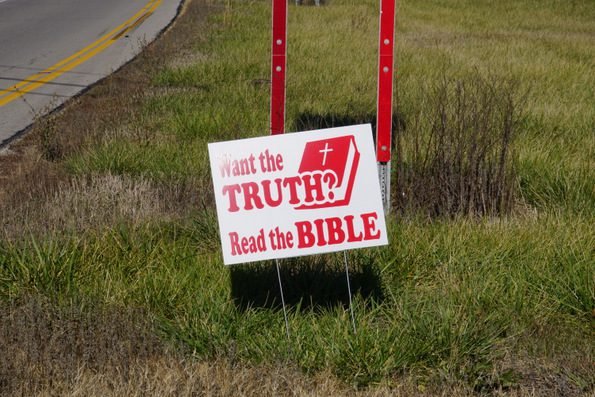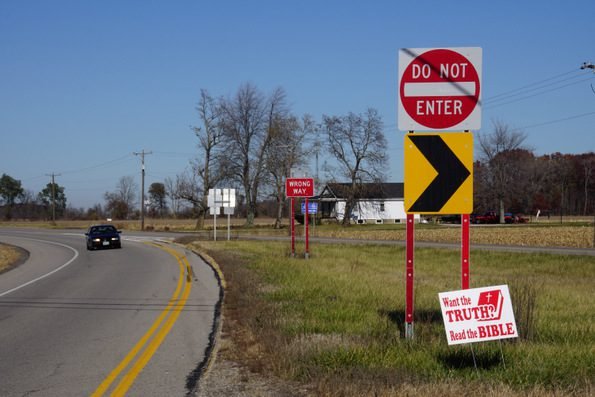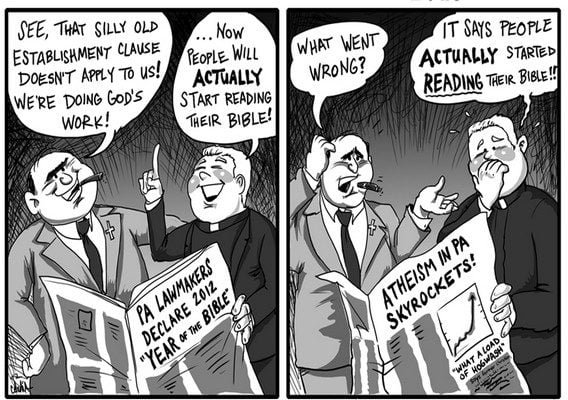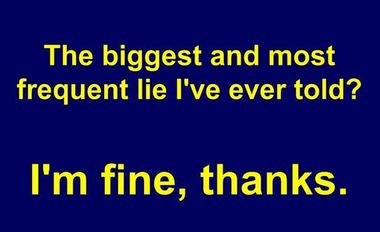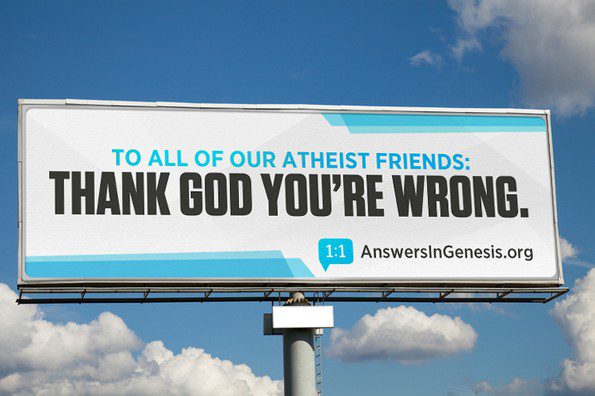
A guest post by Justin
Warning: a good deal of my thoughts and feelings on all this are quite raw. If I come across that way, I’m not meaning to demean or offend. I do my best to be polite. I can’t help but feel I am taking an awful risk. It’s with a great deal of trepidation that I get into this more than on a surface level. The images of children stumbling and millstones have a permanent imprint on my mind. But, I think everyone here can handle it. Besides that, I’m not encouraging anyone to follow my ways or path–you are responsible for yourself, your faith, your life with or without god. But I do–and you should–proceed with caution.
I am a product, not of IFB/Evangelical fundamentalism, but of Campbellite/Church of Christ fundamentalism. I left that for liberal Evangelicalism, only to find the grass wasn’t greener. I am currently in the long, drawn-out process of leaving the Faith altogether. But, I will admit “faith” is something I’m not so sure I am leaving. I don’t know, anymore.
I admit right off the bat that I am not an atheist. I am agnostic, but lean toward some kind of Jesus pursuit. I no longer believe in any inerrant bible or literal “word of God”, but I still think the Bible is a valuable document to carefully read and consider, in the same way the Tao Te Ching or Das Kapital are valuable to read and consider. I doubt I would be considered “Christian” in most senses, anymore.
I was born in Amarillo, Texas, the firstborn to parents who were at least third-generation Campbellites. As such I grew up in the non-institutional, non-instrumental churches of Christ. If you know the history of that “movement”, you will know that says enough about the theological baggage I carry around.
Campbellite baptism is how I was taught to approach “getting saved”, which was always separated from believing. I had always believed, always knew Jesus, even from childhood; until now I never knew a time of “unbelief.” That did not mean I was saved, however. “Faith and works” were always held in tension, and neither were sufficient to get me into Heaven. My baptism sprang from a fear of Hell, but it also developed from teenage angst about growing up in the church. I relented under the typical church pressures, but my conversion was sincere even if less than fully “educated.” An argument can be made that no discernible change in life resulted. Looking back, that is a significant note to keep in my back pocket.
I met my wife in high school. She was a profoundly unhappy girl and I vowed to be the one person in town who would not add to her sadness, if not be the one to make her happy. There was just one problem: she was a Catholic. Again, if you know anything about the Churches of Christ, me even dating her was a mighty scandal.
Misfits
That is what marrying my wife made us. After we both graduated from college, we moved to the Detroit area, far away from our Colorado home. Incidentally, we lost two children, and I nearly lost my wife. What I also lost was my armored perspective on good and evil, right and wrong. We moved back home soon after and had our first [living] child. We then, almost immediately, lost my mother-in-law. Our firstborn was diagnosed with Type-1 diabetes at age 5, as was I one year later–as an adult. Gain and loss have became prominent themes in our life together. These events solidified our existence as misfits, and life soon became an exercise in dealing with the unmet expectations of others; not least of which were the expectations of other Christians.
What I was learning was that my family were–and are–the greatest gifts I have been given. I discovered they are more valuable than even my “salvation.” My family, and not the church, taught me about love. Everyone else taught me about expectations, and the consequences of not meeting them.
I am an engineer. For a time, I worked construction, which was not the industry for which I was educated. Once again I was a misfit, a fish out of water. Years of this lead to a restlessness and anxiety, feelings of being trapped with no other options. The funny thing was that my time in that job was a sort of parable of my wider life. At the time I mistakenly thought it was a “faith-lesson” strengthening my Christianity. Big mistake. I did learn what faith truly was, and it was not what the church told me it was.
Faith
The Hebrew Bible talks of the refiner’s fire. My branch of engineering deals with steel-making, so blacksmithing has deep root in my consciousness. There are no miracles in the blacksmith’s world, only long, arduous work. The blacksmith doesn’t “believe” or “pray” for a result, he takes his hammer, anvil, and a very hot fire and beats on a piece of steel until it is a useful tool. It takes hours, days, or weeks to create something of use. Only after hard work does his effort bear any fruit.
Similarly, Jesus talked of moving mountains with only a little faith. Christianity has left us with the mistaken notion that the right faith would allow us to instantly throw that trillion-ton pile of rocks and trees into the ocean with a wave of our hands. Or, that the right faith would bring us untold riches and health. Life has taught me otherwise. Moving mountains takes faith, alright, but the kind of faith that picks up the shovel and scoops the dirt day after day, week after week, year after year. A mountain is moved one rock at a time. I know this because I watched it happen on a job site: one shovel, one bucket, one dump truck, one day at a time. It was boring and monotonous. And it surely was not instant.
Finally, Jesus talked about building on rock and not sand. This was the easy one to learn. Any house or other structure worth its money is built on a solid foundation. What is the foundation of fundamentalism? What is it but the sand of inerrancy, or the shakiness of one literal, modern interpretation of a collection of ancient texts. Even the “eyewitness” accounts of Jesus of Nazareth are rife with corrupted and uncorroborated evidence. Christianity, as it stands now, is built on a surprisingly shifty foundation. Not a good start to building a life.
Learning these lessons has shown me, in the here and now, that I generally live life in tension; I am holding contradictory positions. It is not a good situation for an engineer to hold to an existence of cognitive dissonance. So, now I’m wavering.
Where I’m At
In a manner of speaking, I have no issue with the people of the church, although I haven’t been to meetings in many months. I am happy with most of the people, however the church is, and all churches are, bound by a system and spends too much energy and treasure to feed itself. Having so much stock invested leads to rules and expectations on people that aren’t really justified. From what I read and understand in the Bible, the church was meant to be about a community in relationship. But, so much of the activity and program of church makes authentic relationships nearly impossible.
But none of that is the driving issue with me. I might be able to live and cope with those idiosyncrasies. Coming face to face with some of the things happening in my life–random, causeless things–has caused doubts to take center stage, doubts I’ve always harbored and tried to work out on the back burner. As it is now, I’m skeptical of nearly everything–church, theology, family priority, god itself. I feel like I’m watching the deconstruction of everything I’ve ever believed, hoping to be left with enough to rebuild, or to be convinced rebuilding is worth the energy, or even necessary.
[Warning: severe understatement ahead.] Generally speaking, the church doesn’t deal with doubt very well. Just try to question a pastor’s decision, debate the elders’ authority, resist any authority, doubt the Bible, or doubt an agenda or program. Try questioning the small group ministry and see where it gets you. Simply asking the question, any question, gets you branded. This doesn’t even consider questions about the arguably more important topics of doctrines and practice. Individual friends, even while uncomfortable, will help you entertain doubts, to a point. But when the corporate body is involved, doubt is quashed, because it can’t be managed or controlled.
I doubt. I question. I doubt well-established, deeply held, fundamental things. From the time I was a boy, as far back as I can remember, I have never really doubted god. For the years that I’ve known and learned about god, I had never doubted who he was or that he somehow loved me. That is, not until now.
I suppose the spiritual growth process requires doubt at some time. It seems that in doubt, faith and perseverance must grow to overcome it. Still, when these doubts came, it brought a tremor deep within that I did not expect. It has brought fits of very intense emotion. It has been difficult to keep my composure when confronted with my doubts.
Over the past few years, I have been exposed to new–at least new to me–theological hypotheses. What they are is not the point, and I don’t wish to argue their merits or faults here. Their effects on me, however, I need to work out. Having believed a certain thing about god for so long, I have agonized over having that foundation cracked, even if just a little or just in perception. After half a lifetime of being quite sure of what I believed, that assurance has been shattered, and worse, may yet be proven to be based on something completely false. To someone like me, who is comfortable with facts laid out in an orderly, black and white fashion, this is the height of uncomfortable.
While I don’t like to call it “panic”, a sort of core panic has set in. Admittedly, my first reaction was one of anger. I felt lied to and duped. To some extent, I still do. I re-read scripture passages, along with a few new sources of information and I begin to see all sides as having some merit in their positions. A deeper depression sets in, and then harder questions rise up. “Which is it?”, I ask myself. “Both?” “Neither?” “Does it matter?” In my black and white mind, there must be an answer. What is truth?
I think of Job… what an awful thing to happen to one person. Not only did he lose almost everything, his wife and three friends were of no comfort. Nevertheless, god steps in to end the argument. God, interestingly enough, lectures Job on speaking where he has no knowledge. Funny—the whole time Job is crying out to god as his final arbiter, calling for vindication—he receives a stern reprimand. All the while, Job gets no answers to who was right in the final theological analysis. None. Job and his friends are left wondering. And so am I. It seems everything was set aright, for the most part, for Job after all. But what was the point of having to suffer so overwhelmingly? Was it just so god could prove a debate point?
If the experiences of Job teach me anything (assuming that god is indeed benevolent), it is that god doesn’t call us to nail down our theology to be acceptable to it. He calls us to trust it. All of our understandings are feeble. This isn’t to say truth is not important. It is to say that god holds truth, not us, and not me. Therefore, we need to trust him and not scholars, theologians, preachers, or ourselves.
Such is wholly unacceptable to some people. I get that. And, it is all predicated on a god who is there to trust in the first place. What if it isn’t? Can “God” be reasonably presupposed, even with the claims of the Cloud of Witnesses?
I can’t really nail down a single event which has brought all of this to the forefront. I could name several candidates, but how exactly they fit in would take volumes to describe and tie together. The nearer ones would be easier than those far off, but only relatively. Whether it was a grandfather’s declaration that I wouldn’t amount to much, or a pastor’s desertion of the flock in his charge—or any of a thousand more incidents and accidents—all had their part to play in my derailed faith.
Even so, if I had to venture a guess at a common thread it would be this: cognitive dissonance. That is, that which I believed or wanted to believe was not what I saw or thought I saw. The truths I held were not what in reality was or is. Mutually exclusive ideas cannot be true at the same time.
Over the past few years I have been dealing, in my mind, with the dichotomy of how life should be versus how life is. I am unable to confirm the quote, but Mel Blanc is purported to have said, when comparing his characters Bugs Bunny and Daffy Duck, “Bugs is the ideal we all try measure up to, but Daffy is who we see in the mirror every morning.” That seems to fit it into the nutshell I’m talking about. Similarly, the “Christian life” is such a lofty ideal, but when compared to reality, it looks like a sham.
Is there any hope? Society surrounding me leads me to believe not. Depending on which preacher you sit in front of on Sunday mornings, no matter the platitudes and “gracious” language (if you’re fortunate enough to get even that), the answer is still no. For every fellow addict who understands and knows the struggle, there are 99 “good” citizens who deny any issues of their own and stand in judgment of your law-breaking.
So, I’m left with a choice. I can be honest with myself and everyone, taking the barbs and arrows from a society and a religion who don’t understand and don’t really care to understand, or I don the mantra of the Wizard, hoping to distract all Oz from the reality of who I am. It feels like the only way is the wrong way.
I really don’t know what to do with this. I haven’t been taught to deal with it. It has always been that I don’t measure up, and I have to measure up before god will love me, but it’s impossible for me to measure up. To a certain extent, I have been convinced there is no hope. Go to any church, and likely you will find there are rules and expectations before you are accepted as “one of us.” Churches are not the only culprit, society at large has the same expectation—do what we say or else.
But, if you boil down the story of the Bible, that is not what god seems to be saying, at least that isn’t how I read it. No matter what I think of god and his interaction (or lack thereof) in this screwed up world, the book says that through Jesus somehow things are different. The man behind the curtain can be exposed for who and what he is, and god accepts him… accepts me. He will deal with me kindly and fairly.
I don’t know about you, but I never hear that in the churches I’ve been associated with to this point. Spend a single day in the secular world and you will find this, too, is an anathema. I’m only now getting the whole thing through my own thick, judgmental skull. The thing is, I still don’t know what to do with it.
There is no point in running down the list of things I still believe or things I don’t believe anymore. The details of the jots and tittles have caused enough madness. The best I can give you at this point is that I am agnostic about the whole thing. I simply don’t know. Further, I’m skeptical of anyone who claims they do know. I’m skeptical that some things are even knowable.
If you want to know what I believe, watch me. See what I do and how I act. That will tell you all you need to know. Maybe the reason there was no change in my life at my conversion was that I didn’t really believe it in the first place.
I was and continue to be skeptical of any Sunday School teacher or pastor from my past. I know they don’t know. And here I am: a walking contradiction. For all my years, this is what I have heard: Sure, god loves me and sent Jesus to save me, but… BUT… if I don’t ________, then [insert any one of the typical religious threats here]. For all my years, I have tried to conform and do as I was told. It has gotten me nowhere. I’m still the same person, with the same personality issues, the same social ills, the same faults, and the same sins.
I can’t continue down the same path. I’m not sure I even want to, anymore. I can’t keep the inevitable at bay.
My conclusion is that I’m done. I can’t do it. I have never been able to do it. All I hear is, “You need to do more… do better… don’t do that… do this… change… pull your weight… contribute… make a difference… obey…”
So, I’m not going to try, anymore.
A well-written deconvert to atheism explained his experience in this way:
“These are the three things that changed my thinking: a major crisis, plus new information that caused me to see things differently, minus a sense of a loving, caring Christian community.” –From John W. Loftus, Why I Became an Atheist, Prometheus, 2008.
I mention this quote not to say that all of this must turn out, in the end, as me turning to atheism. It is more of a warning to myself that I am three-thirds of the way down that path Loftus describes.
To this point I have found only one fact I can rely on: love. While that fact carries a lot of weight in and of itself, it doesn’t necessarily answer the questions I’m haunted by. It is a hopeful start, even so. I consider love to be the chief end of life; love of others, primarily. Life is too difficult to go through without a friend to help along the way. Jesus supposedly spoke of love, but his followers show an appalling lack of it. This is the chief reason I have left the church and Christian religion: so few of Jesus’ so-called “disciples” actually love anyone. I don’t blame Jesus, I blame those who do what they do in his name. I still believe in love, even if I don’t know if I believe in god.
That, of course, could all change. In all of this, I’ve learned something about myself. I’ve told you the story, for the most part. From as early as I can remember I have felt like a misfit, not meeting family, friends’, and others’ expectations. Well, my response to it all has always been, “I’ll show them.” I was driven to prove myself to any- and everyone. High school valedictorian, smallest defensive end in the league, if not the State (All-Conference). Graduate from the best engineering school in the country in 4 years. Aced the class the prof said I had no business taking. Save the company I work for millions per year. Professional Engineer Certification in a 3rd discipline I was not educated in. Prove my boss wrong. Defy church leadership because–damn it–they’re wrong. Etcetera, and etcetera, blah, blah and blah. Then all of it came crashing down.
No matter how good, right, or correct any of that stuff is, I only did it to justify myself. My complaints toward anyone who opposed me, criticized me or didn’t “like” me was not one of rightness, but of not validating me, my ego. Like many before, I didn’t like myself, so I sought to force everyone else to do so as compensation. “I’m the smartest guy in the room; I’m right and you can’t deny it.”
I am who I am. That is enough. Jesus told his followers, “Love your enemies.” Ghandi said, “The weak can never forgive. Forgiveness is the attribute of the strong.” Lao Tzu said, “When I let go of what I am, I become what I might be.”
I figure, now, I just need to let it all go. I don’t need to show anything to anyone. I just need to love and forgive, and not grasp at those I find around me. Then I can let the rest of it fall where it does. That doesn’t answer any questions, but maybe in the end that is the beginning.
Share This Post On Social Media:


